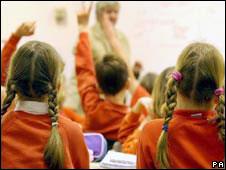Coalition agrees on free schools
- Published

The coalition says schools should have more freedom over what is taught
The new coalition has confirmed it will press ahead with plans for "free schools" in England and for schools to get more money for poor pupils.
The changes will make it easier for "new providers" to set up schools in the state system - including parents and teachers.
The coalition document, released on Thursday, also says schools will be given more freedom over the curriculum.
Both parties had backed the idea of a "pupil premium".
They say this premium - where money follows the poorest students to schools - will be paid for "from outside the schools budget by reductions in spending elsewhere".
The Liberal Democrats had insisted in the run-up to the election that the scheme should be fully funded. They wanted an investment of £2.5bn.
State monopoly
The document says: "We will promote the reform of schools in order to ensure that new providers can enter the state school system in response to parental demand; that all schools have greater freedom over the curriculum; and that all schools are held properly to account".
It continues: "We will give parents, teachers, charities and local communities the chance to set up new schools, as part of our plans to allow new providers to enter the state school system in response to parental demand".
A foreword to the document promised "a breaking open of the state monopoly and extra money following the poorest pupils".
The idea of encouraging all good schools to "opt out" of local authority control by becoming academies is not explicit in the document, although we understand this will feature in the Queens Speech, when the government will set out its plans for legislation.
Liberal Democrats generally like the idea of schools being held accountable locally.
Schools will also get more freedom over what they can pay teachers, the coalition pledges, a move which will be unpopular with many teaching unions.
The document says: "We will reform the existing rigid national pay and conditions rules to give schools greater freedoms to pay good teachers more and deal with poor performance".
And the parties pledge: "We will give heads and teachers the powers they need to ensure discipline in the classroom and promote good behaviour".
The coalition document confirms many other Conservative election pledges, including promises to allow state schools to offer the iGCSE favoured by some independent schools, to "review" the national schools tests (Sats) and to create "Technical Academies", where students can follow vocational courses from the age of 14.
The parties also support the creation of new faith schools.
"We will work with faith groups to enable more faith schools and facilitate inclusive admissions policies in as many of these schools as possible," the document says.
The document also confirmed the government's intention to shake up the schools inspection regime in England, run by Ofsted, saying the coalition would "simplify the regulation of standards in education and target inspection on areas of failure".
Chris Keates, the general secretary of the NASUWT teaching union accused the Liberal Democrats of accepting Conservative policies wholesale.
"When the Conservatives published their invitation to join the Government of Britain, the Liberal Democrats said the Conservatives' approach to school reform 'is completely muddled' and branded plans to reform the curriculum as 'confused, ill thought out and naive'.
"Based on the document issued today it is now clear that the Liberal Democrats have now accepted the 'Invitation to join the Conservative Government of Britain' unconditionally," she said.
'Mixed bag'
But the other big classroom teachers' union, the NUT, saw good and bad in the announcements.
General secretary Christine Blower said: "The final coalition agreement on schools is a mixed bag. There is now included some welcome protection for Sure Start. It appears that there is a door open to reform Ofsted and league tables.
"At last a government has agreed a review of the Key Stage 2 tests. In the light of our boycott with the NAHT this is a step forward.
"However the proposals for groups to set up their own schools, irrespective of local planning needs, are a major step back. It will create planning gridlock and social division.
"The government needs to step back from this obsession that anyone other than a local authority must be better at running schools. What is needed is a good local school for every child working within their local family of schools."
Ms Blower was also critical of moves to weaken national pay and conditions for teachers.
- Published13 May 2010
- Published12 May 2010
- Published10 May 2010